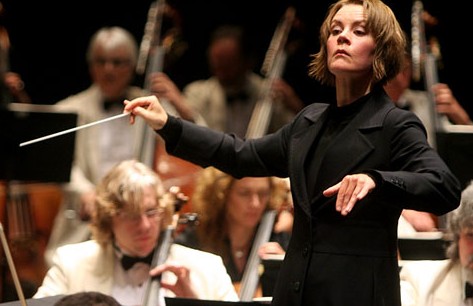 |
| Antonia Brico, first woman conductor to achieve international recognition |
The last domain in Western music world lacking dramatically of female musicians is the field of conducting. There have been only very few women conducting major orchestras, the first one being Antonia Brico (1902-1989). She was the first female conductor to get international recognition, but never wanted to be noticed by her gender. Because never has gender made a difference in the quality scale of someone’s production and noting the gender would be stating a difference between male and female work.
Still today, in all societies, most important
positions are held by men, and in many countries it is still difficult to accept
for a woman to be in a position of power. Orchestras have only recently been more
welcoming to woman musicians, even
though it has sometimes raised an issue; in 1996 there was a discussion amongst
the Wiener Philharmoniker about the problem
of “the loss of unity” and the financial problem caused by the possible
maternity leaves, if women would be hired. In this frame of mind, it is easy to
understand that the refusal to work with woman conductors and hire them has
seemed natural. The situation is slightly different from one culture and
country to another, depending of historical and religious circumstances.
Being
French, I have often wondered why in France, it seems women start getting
important positions in politics, while in classical music, for a conductor who
is a woman it is still difficult. A true rivalry exists also, surprisingly,
between women, something I have myself encountered as a conducting student, and
having spoken with some conductors they have made the same statement; female
members of orchestras tend to be the most aggressive facing a woman on the
podium –probably bitterness or jealousy, while one would think they would
rather encounter a certain feeling of pride for their gender that has been
excluded from the profession for so long.
Then, there are also people who think that a conductor
needs power, energy, and that women are weak and that the profession of
conductor is therefore “against their nature”; they apparently would also
distract man players.
One of the most recent scandals arose from a radio
interview given by Bruno Mantovani, the young director of the Paris
Conservatoire, repeating some of these old beliefs while trying to find reasons for the small
number of female conductors. You can find a translation of this interview online
–or in the Bibliography at the end, as well as articles about other
personalities having talked about the subject.
Female conductors exist. But even today, the number of
internationally recognized female conductors can be counted on one hand.
One could say that today, the two most prominent personalities are the Finnish conductor Susanna Mälkki and American Marin Allsop.
Orchestra managers and concert programmers still fear hiring women to conduct their concerts, but without their investment it will be difficult to progress into the right direction!
One could say that today, the two most prominent personalities are the Finnish conductor Susanna Mälkki and American Marin Allsop.
Orchestra managers and concert programmers still fear hiring women to conduct their concerts, but without their investment it will be difficult to progress into the right direction!
 |
| Susanna Mälkki, one of the most distinguished conductors today |
Aucun commentaire:
Enregistrer un commentaire